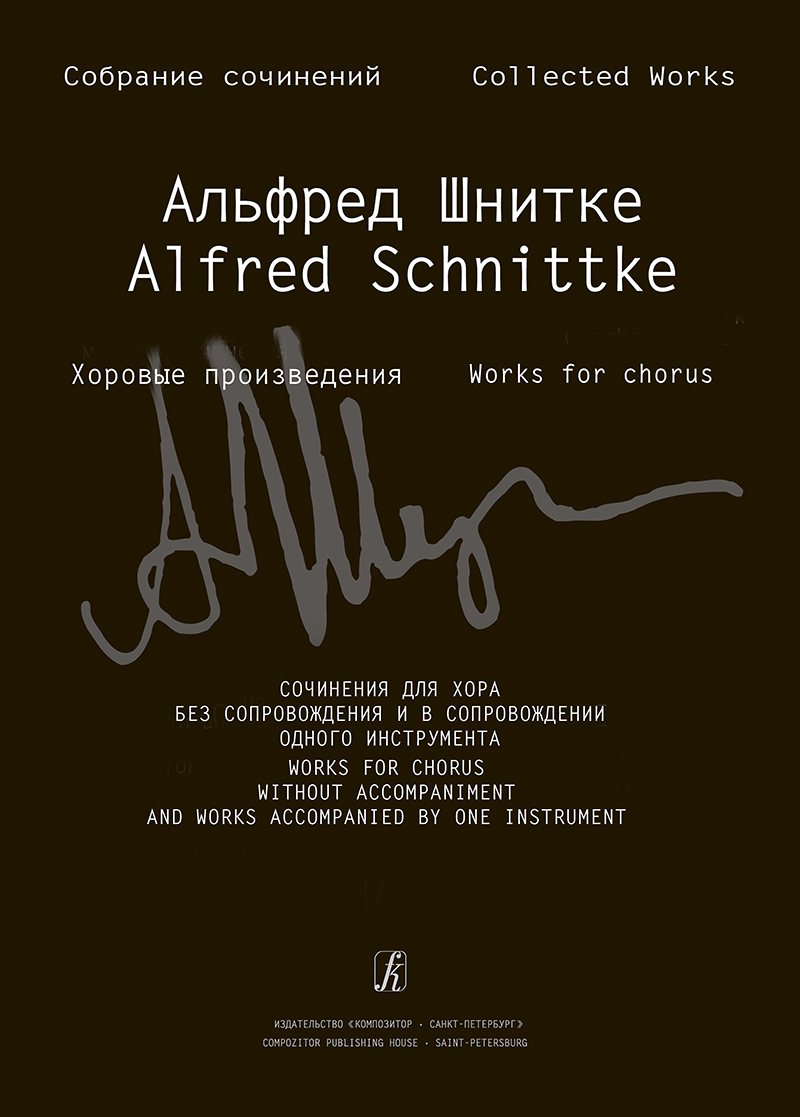
Schnittke A. Works for chorus without accomp. and works accomp. by one instrument (Coll. Works. S. 4. Vol. 6)
- Author:
- Schnittke A.
- Author (full):
- Alfred Schnittke
- Title (full):
- Collected Works. Critical edition based on the composer's archive materials. Series 4. Works for chorus. Volume 6. Works for chorus without accompaniment and works accompanied by one instrument
- Number of pages:
- 60
The publication of Alfred Schnittke’s Collected Works is a joint project of the Compozitor Publishing House · Saint-Petersburg and the Alfred Schnittke Archive at Goldsmiths College, University of London. This critical edition is intended for performers, scholars and music lovers interested in Schnittke and his music. Its main purpose is to provide them with access to his scores, which are not readily available in Russia or elsewhere. All the scores have been checked against Schnittke’s manuscripts and existing publications of his music аnd have been edited by leading performers who collaborated with the composer.
Works for choir make up a significant part of Alfred Schnittke’s creative output. He wrote many compositions for, or with, choral forces: two cantatas, an oratorio, cycles of choral works and standalone pieces. Choirs play significant roles in his Second and Fourth symphonies, all three of his operas, his ballet Peer Gynt, his “scenic composition” Der gelbe Klang [Yellow Sound], and in his film and incidental music. Schnittke showed a good understanding of choral music and used choirs very skilfully, making full use of their expressive potential. He received training as a chorus master, in 1949-53 at the Moscow October Revolution College (since renamed the Schnittke Institute), where he specialised in choral conducting and composition. He later recalled that he very much enjoyed choral conducting. Schnittke’s first published composition, Songs of War and Peace (1959), was written for chorus and orchestra. The cantata was performed in the Great Hall of the Moscow Conservatory in 1960. It was one of the very few works of his early career to meet with official approval. Schnittke’s graduation piece, following five years of study at the Moscow Conservatory, was also a choral composition: the oratorio Nagasaki (1958), which was praised by Shostakovich.
CONTENTS:
A page from the autograph of the chorus Winter
Preface
Editorial Notes
On Transcription
THREE CHORUSES. For mixed choir a cappella
Mountain Peaks. Lyrics by Mikhail Lermontov (Music text example)
First version
Second version
Wherever You Go. Lyrics by Mikhail Isakovsky
Winter. Lyrics by Alexander Prokof’ev
VOCALISE. For mixed choir a cappella
CHORUS FROM THE FILM AUTUMN. For mixed choir a cappella. No lyrics (Music text example)
THREE SACRED CHORUSES. For mixed choir a cappella
Rejoice O Virgin
Jesus Prayer
Our Father
ERÖFFNUNGSVERS ZUM ERSTEN FESTSPIELSONNTAG / OPENING VERSE TO THE FIRST FESTIVAL SUNDAY. For mixed choir and organ. Lyrics from Psalm 47:2 (47:1)
VOICES OF NATURE. For female choir (or ten female voices) and vibraphone. No lyrics (Music text example)
Comments
- Author
- Schnittke A.
- Author (full)
- Alfred Schnittke
- Title (full)
- Collected Works. Critical edition based on the composer's archive materials. Series 4. Works for chorus. Volume 6. Works for chorus without accompaniment and works accompanied by one instrument
- Number of pages
- 60
